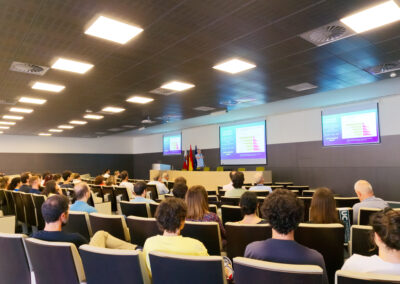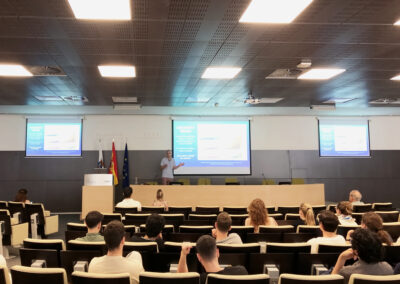NEWS
From planetary health to local health in the context of climate change’: the theme chosen by IHCantabria to celebrate the 50th anniversary of World Environment Day.
Led by the United Nations Environment Programme (UNEP) and celebrated every June 5 since 1973, World Environment Day is often the world’s leading platform for environmental outreach.
In line with its commitment to environmental sustainability, the Institute of Environmental Hydraulics of the University of Cantabria (IHCantabria) organized a seminar to analyze how knowledge of the interactions between humans and natural processes is essential to understand and mitigate the risks associated with global warming and to adapt to future climate scenarios.
The speaker at this seminar was Pablo Fernández de Arróyabe, professor at the Department of Geography, Urban and Regional Planning of the University of Cantabria (UC) and editor-in-chief of the scientific journal International Journal of Biometeorology, published by Springer Nature. Based on his multidisciplinary academic and professional experience, Fernández explained why scale and geographical method can become key factors in understanding the complexity of the risks that human activity generates on its own habitat.
As part of the celebration of World Environment Day, Fernandez stressed the importance of understanding the symbiosis between human activity and natural processes. “In this sense, the health of people is closely linked to the health of the planet and the health of its ecosystems. We understand that there cannot be healthy individuals, or healthy species, if the ecosystems they inhabit are not healthy,” says Fernández.
This UC professor and researcher values the efforts to promote citizen awareness, to minimize the negative consequences of environmental pollution and to correct human behaviors that are affecting nature. In his opinion, the awareness that we inhabit a sick and limited planet -in terms of space and available resources-, as well as the need to understand human growth and development from new economic paradigms, are generating a new collective conscience that progressively demands new modes of development and protection of nature.
“That is where climate change is an element that generates awareness, at a global level, of the need for human beings to protect their natural environments, both oceans and mountains, terrestrial and marine ecosystems, and cryosphere zones,” says Fernández, “because everything has a dynamic that, if altered, can alter the well-being of human beings. To ensure the effectiveness and efficiency of early warning systems, Fernandez believes it is essential that they are developed on the basis of citizen science strategies.
Key messages of the seminar
- It is necessary to assume a new paradigm, based on nature-based solutions, to address the idea of global health, so that the dual ecosystems (physical and social) are considered together.
- The geographic method is very valid for this approach, as was already proposed with medical topographies, although the global scale requires the use of complex information systems that incorporate heterogeneous data, not only health data, and in which the geographic-spatial component is fully integrated and analyzed.
- It is essential to redefine the spatial units of analysis – administrative units alone are not enough – if we are to correctly approach the complexity of the health problems that arise in the 21st century.
- Climate and bio-meteorological services in the field of health must be personalized and oriented towards the definition of individual vulnerability profiles, in order to accurately define real risks, and this requires a collaborative science approach and citizen participation.
50th Anniversary of World Environment Day
World Environment Day has been celebrated every June 5 since 1973. Each year it is hosted by a different country; in 2023, the host country and organizer is Côte d’Ivoire. This year marks the 50th anniversary of this worldwide celebration, which was first established by the United Nations General Assembly in 1972.
This year, with the slogan “No Plastic Pollution”, World Environment Day focused on this issue and called on governments, private companies, citizens and all stakeholders to amplify and implement effective measures against this type of environmental pollution.






